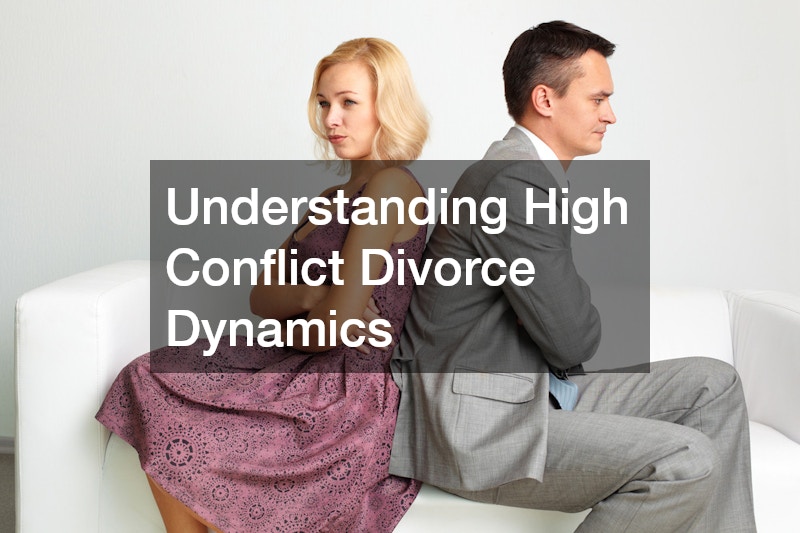Divorce is never easy, but when emotions, power struggles, and unresolved issues escalate, it can become a high conflict divorce. In such situations, both parties may find themselves entangled in a legal, emotional, and financial battle that feels never-ending. High conflict divorces often involve complex dynamics, with heightened tensions affecting not only the spouses but also their children and extended families. The experience can be overwhelming, and navigating through it requires a solid understanding of both the emotional and legal challenges involved. To protect your rights and minimize the emotional toll, it’s essential to be prepared with the right strategies. This blog explores the key aspects of high conflict divorce, including legal strategies, self-protection techniques, and how to maintain emotional resilience throughout the process.
Understanding High Conflict Divorce Dynamics

Ongoing hostility, frequent disputes, and a breakdown in communication between the parties involved characterize a high conflict divorce. Unlike more amicable separations, high conflict divorces are often marked by repeated disagreements over critical issues such as property division, child custody, and financial support. The emotional volatility can be draining, and both parties may struggle to come to a resolution, creating a prolonged and difficult process. Understanding these dynamics is crucial for anyone involved in such a divorce, as it helps to recognize the patterns of behavior that may increase the intensity of the conflict.
When facing a high conflict divorce, it’s particularly important to have a strategic approach. Divorce lawyers can help identify the tactics commonly used in these high-stress situations and recommend ways to mitigate the conflict. For instance, some individuals may resort to manipulation or aggressive legal tactics to gain an advantage. Understanding these dynamics allows you to remain composed, focus on your objectives, and develop a plan for moving forward, all while minimizing the emotional toll.
Identifying Signs of a High Conflict Divorce
Recognizing when a divorce is escalating into a high conflict situation is key to taking proactive steps to protect your interests and emotional well-being. Some common signs of a high conflict divorce include frequent verbal altercations, an unwillingness to cooperate on important matters, and a tendency to escalate minor disagreements into major battles. When communication between spouses breaks down completely, and there is no willingness to compromise or seek mediation, you may be entering high conflict territory. Financial disputes, particularly over shared assets, and a lack of willingness to share custody of children or compromise on visitation rights, are also common indicators. Identifying these early warning signs is critical because it allows you to take the necessary steps before the conflict deepens and becomes more complex.
Once you’ve recognized that your divorce is heading into high conflict territory, it’s time to seek the guidance of a divorce law firm. These professionals are experienced in dealing with the complexities of high conflict divorce and can offer personalized advice and legal strategies to help you protect your interests. They can assist in navigating contentious issues, such as child custody arrangements or asset division, and provide the legal support you need to avoid common pitfalls.
Key Legal Strategies for Protecting Your Interests
In a high conflict divorce, one of the most important steps you can take is to develop strong legal strategies to protect your interests. The complex nature of these cases often requires specialized legal approaches, as the emotional volatility between parties can cloud judgment and influence decision-making. Legal strategies might involve clear documentation, negotiation tactics, and sometimes, aggressive litigation tactics to ensure that your rights are upheld throughout the process.
For individuals going through a divorce, having the support of an injury attorney may be necessary, especially if the divorce involves physical altercations or threats. In these cases, it’s crucial to take the right legal actions to protect yourself from harm. Injury attorneys can help with restraining orders or other legal measures to ensure your safety, while also providing assistance if there are claims of physical harm or emotional distress. The strategic role of an injury attorney extends beyond just handling physical injury; they also focus on protecting your rights to a safe environment during this challenging period.
The Role of Mediation in Divorce

Mediation can be a crucial tool in resolving disputes during a high conflict divorce, though it may seem counterintuitive given the animosity that often defines these cases. Unlike litigation, which can further entrench both parties in their positions, mediation provides a neutral space where each side can work toward compromise with the help of an experienced mediator. While mediation may not resolve every issue, it can be especially useful in addressing the most contentious matters, such as child custody, visitation rights, and financial division.
However, it’s important to note that not every high conflict divorce is suitable for mediation, especially when one party is unwilling to participate or is engaging in manipulative behavior. In such cases, the support of criminal attorneys might be necessary. If there are threats of violence or criminal activity involved, criminal attorneys can help safeguard your rights and ensure that the process remains safe. In addition, they can assist in cases where mediation breaks down, providing you with the legal support you need to protect yourself and your family.
How to Manage Emotional Stress During Divorce
Divorce, particularly a high conflict one, can be a deeply stressful experience, not just legally but emotionally as well. The constant back-and-forth, uncertainty about the future, and the toll it takes on mental health can create a volatile environment for everyone involved. Emotional stress can manifest in various ways, including anxiety, depression, or burnout, making it crucial to seek appropriate support during this period. Coping mechanisms such as exercise, journaling, and mindfulness can help to some extent, but it’s often essential to seek professional help in managing the intense emotional stress that comes with a high conflict divorce.
One of the most beneficial ways to manage emotional stress is by engaging in mental health counseling. Professional counselors, therapists, or psychologists can offer valuable guidance, providing a safe space to process emotions and develop healthy coping strategies. Counseling can help you work through feelings of anger, resentment, or sadness that might otherwise hinder your ability to make clear, rational decisions throughout the divorce process. Furthermore, counseling can equip you with techniques for maintaining emotional resilience, which is essential when navigating the challenges of a high conflict divorce.
Navigating Child Custody Battles in High Conflict Divorce
When children are involved in a high conflict divorce, the stakes are much higher, and the emotional toll can be profound. Child custody battles are often one of the most contentious aspects of a high conflict divorce, as both parents may feel entitled to a larger share of custody, leading to intense disputes. In these situations, it is essential to prioritize the children’s well-being and work to minimize the impact of the conflict on their lives. A fair and balanced custody arrangement requires careful consideration of the children’s needs, while also taking into account the level of conflict between the parents.
It is important to have a strong understanding of childcare needs during and after a divorce to ensure the best possible outcome in a child custody dispute. Childcare professionals can play an instrumental role in evaluating the children’s needs, offering recommendations on living arrangements, and providing a neutral perspective on the family dynamics. They may also help develop parenting plans that address the needs of both parents and children, ensuring that each parent has the opportunity to maintain a meaningful relationship with their child.
Building a Strong Legal Team for Your Divorce Case

In a high conflict divorce, one of the most vital steps you can take is to assemble a strong legal team. A high conflict divorce is complex, and having the right professionals by your side is essential to navigate the intricacies of the legal system and ensure that your rights are protected. This team often includes a divorce law firm, which can provide you with legal advice, representation, and a strategy that is tailored to your specific case. Divorce lawyers specializing in high conflict cases will help you handle the nuances of difficult negotiations, contentious legal battles, and strategies to protect your interests in court.
A comprehensive legal team might also include financial experts, mental health professionals, and other specialists who can contribute to the case in various ways. For example, financial experts can help evaluate complex assets and ensure fair division, while mental health counselors can assess the emotional impact of the divorce on both you and your children. Additionally, in situations where your health might be at risk due to the emotional strain of the process, seeking support from an urgent care clinic is essential. If you’re dealing with stress-related health issues, such as severe anxiety or physical symptoms exacerbated by the ongoing conflict, a clinic can provide immediate medical attention and help address urgent health concerns.
Effective Communication Strategies with Your Ex
Effective communication is one of the most critical factors in managing a high conflict divorce. The ability to communicate clearly and calmly, despite emotional turbulence, can make a significant difference in resolving issues without escalating the conflict further. In a high conflict divorce, however, maintaining effective communication can be particularly challenging, as both parties may be highly emotional or resistant to cooperating. To minimize conflict, it’s important to set clear boundaries, keep conversations focused on the issues at hand, and use neutral language.
In some cases, especially when aggressive behavior is involved, you may need the help of an assault attorney. If there has been any physical violence or threats, an assault attorney can help you navigate the legal actions necessary to protect yourself from further harm. This can include obtaining restraining orders, taking legal action for domestic violence, or addressing any criminal behavior associated with the conflict.
The Impact of High Conflict Divorce on Children
The impact of a high conflict divorce on children can be profound and long-lasting. Children exposed to ongoing hostility and conflict between their parents are more likely to experience emotional distress, behavioral problems, and difficulties in their social and academic lives. The constant tension and lack of stability can lead to feelings of anxiety, confusion, and sadness. Children may also struggle with loyalty conflicts, feeling torn between parents or fearing that they are the cause of the issues.
One way to mitigate the negative impact on children is by involving a certified addiction professional when necessary. If either parent is struggling with addiction, it can exacerbate the negative effects of a divorce on the children. A certified addiction professional can assist in evaluating the parent’s ability to care for the child, recommend treatment plans, and offer therapeutic support to the children. This can help reduce the stress and trauma caused by the divorce and ensure that both parents are in the best possible state to care for their children.
Steps to Protect Your Financial Future in Divorce

One of the most significant concerns in a high conflict divorce is protecting your financial future. High conflict divorces can involve complex financial disputes, especially when there are significant assets or debts to divide, or when one party attempts to hide or manipulate financial information. In these cases, it is essential to have a clear understanding of your finances and work with professionals who can help you navigate the intricacies of property division, spousal support, and child support.
To protect your financial interests, it’s often beneficial to consult a firearm sale expert if there are concerns about the misuse of firearms in the divorce process. In some cases, a spouse may use firearms as a means of intimidation or control. In high conflict divorces, it’s important to ensure that weapons are safely handled, secured, and, if necessary, removed from the situation entirely. Experts in firearm sales can help with the legal transfer or disposal of firearms, preventing any potential threats to personal safety.
Navigating a high conflict divorce can be a daunting and emotionally charged experience, but with the right legal strategies and self-protection techniques, you can safeguard your interests and start the journey toward rebuilding your life. Recognizing the dynamics of divorce and understanding the legal, emotional, and financial challenges involved is the first step toward creating a healthier future. While no divorce is easy, preparing yourself with the right tools, resources, and support systems can help reduce the toll of conflict and ensure a fairer, more balanced outcome for you and your family.



